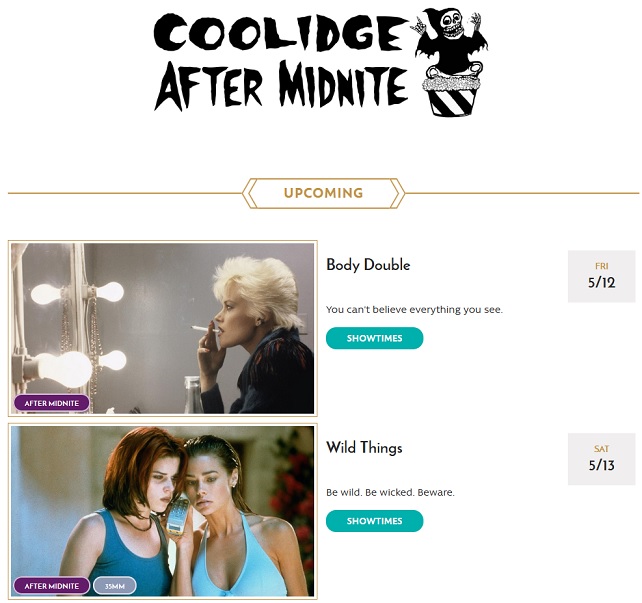KARINA LONGWORTH & SEAN BURNS ON 'BODY DOUBLE' AND THE EROTIC THRILLERS AT COOLIDGE CORNER THEATRE

Brian De Palma's Body Double is one of the films included in the series Pillow Stalk: Erotic Thrillers After Midnite at The Coolidge Theatre in Brookline, Massachusetts. WBUR's Sean Burns writes about the program:
[Karina] Longworth’s pick from the Coolidge program — and my favorite of the films as well — is Brian De Palma’s blissfully irreverent 1984 “Body Double.” Screening this Friday, May 12, the movie stars Bill Maher-lookalike Craig Wasson as a pervy peeping tom duped into witnessing a murder. Directing with his middle fingers held aloft, De Palma answers critics who dismissed him as an Alfred Hitchcock copycat by mashing up “Vertigo” with “Rear Window” and casting the daughter (Melanie Griffith) of one of Hitch’s most iconic iceberg blondes (Tippi Hedren) as a porn star named Holly Body. Griffith’s hugely charismatic performance revived the former teen starlet’s flagging movie career, while De Palma’s flights of puckish virtuosity taunted his detractors with hilariously Freudian sights like the killer wielding a massive power drill at crotch level. We talk a lot about movies that couldn’t get made today, but when it comes to “Body Double,” Longworth admits, “it’s pretty incredible it ever got made.”She’s higher than I am on "Cat People." Screening on May 20, Paul Schrader’s 1982 remake of Jacques Tourneur’s 1942 classic stars Nastassja Kinski and Malcolm McDowell as siblings descended from an ancient race that transforms into hungry sex panthers whenever they get too horny. Despite some sumptuous visuals by production designer Ferdinando Scarfiotti and a hypnotic Giorgio Moroder score, the central metaphor has always struck me as a little too heavy-handed, even by Schrader standards. For a superior supernatural New Orleans-set neo-noir, I suggest Alan Parker's "Angel Heart," which plays on May 19. The film famously got Lisa Bonet fired from “The Cosby Show” for playing a Voodoo priestess who sacrifices chickens while seducing Mickey Rourke’s doomed private dick. (Any movie that so enraged a moral authority like Bill Cosby must be doing something right.)
For further Hitchcock sacrilege — and sacrilege in general — Ken Russell’s 1984 “Crimes of Passion” (screening May 26) stars Kathleen Turner as a buttoned-down businesswoman who puts on a platinum wig and moonlights as a sex worker named China Blue in a skanky, downtown no-tell motel. In this garish, neon underworld, she fends off the affections of a perverted priest played by the “Psycho” himself, Anthony Perkins, in his most repellent performance, which is saying something. Amid such company, Barbet Schroeder’s 1992 “Single White Female” (showing May 27) seems positively demure. It’s a sturdily-crafted, formula potboiler elevated by fine work from a much-missed Bridget Fonda and Jennifer Jason Leigh as her increasingly unhinged new BFF. My guess is it’s included in the program just for an unforgettable scene in which Fonda’s fiancée Steven Weber fails to recognize which roommate he’s with until a little too late.
The erotic thriller basically took its final bow in 1998 with John McNaughton’s “Wild Things,” screening on 35mm this Saturday, May 13. Matt Dillion stars as a hunky high school guidance counselor accused by two students of sexual misconduct in this swampy Florida romp full of sordid revelations and delicious double-crosses. The bad girl turns by Denise Richards and Neve Campbell imprinted upon an entire generation of teenage boys, while Kevin Bacon lets it all hang out as a pushy, ethically queasy cop. But the film is stolen by supporting players Theresa Russell and Bill Murray, who find the sweet spots between half-kidding and camp in a screenplay twisty enough that the plot is still explaining itself throughout the closing credits. “Wild Things” is so hopped up on horny tastelessness it’s almost as if the genre had nowhere left to go.
The very premise of the film is also unthinkable in today’s political climate, which is another reason you won’t see movies like these being made anymore. “I think there is a lot of fear in the culture right now about dealing with all of the issues surrounding sex between men and women,” Longworth says. “We’ve never come close to resolving most of the imbalances and inequalities that charge a lot of these movies of the ‘80s and ‘90s and I think we’re uncomfortable with the lack of progress. I also think that the best of these movies are somewhat ambiguous as to what constitutes ‘good’ and ‘bad’ and ‘normal’ or ‘not normal,’ which is true to human nature but doesn’t jibe with a strain in our culture that wants to pretend that anything they don’t approve of or don’t feel comfortable with doesn’t exist.” Indeed, such stories are probably more palatable to modern audiences with the safe distance of being appreciated as artifacts from Hollywood's problematic past.
But hey, we’ll always have “Body Double.”



